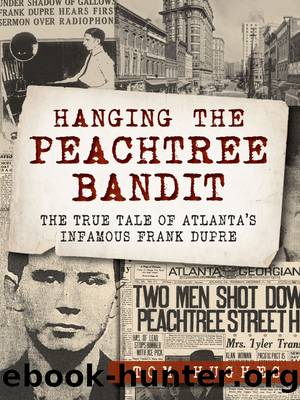Hanging the Peachtree Bandit by Tom Hughes

Author:Tom Hughes [Hughes, Tom]
Language: eng
Format: epub
Tags: True Crime, Historical, History, United States, State & Local, South (AL; AR; FL; GA; KY; LA; MS; NC; SC; TN; VA; WV), Murder, General
ISBN: 9781625849465
Google: Ngp3CQAAQBAJ
Publisher: Arcadia Publishing
Published: 2019-06-24T00:47:03+00:00
Chapter 8
âSomebody Loves This Poor Devilâ
At the Tower, Frank was moved to âCell No. 5, North Wing.â Nearby was âOld Johnâ Williams, awaiting his move to the state prison farm for causing the deaths of eleven Negroes whoâd been held in peonage in Jasper County.37 A white man, Williams had arranged with the local sheriffs to bring him their âtroublemakers.â He quite literally worked them to death on his two-thousand-acre plantation. Williams told a reporter that he was stunned to see the young and slight DuPre. âItâs a shame, you know,â he offered.
Sheriff James Lowry was the man tasked to do the hanging. He had hanged several men since taking office in 1917, most recently a rapist in 1920.38 But Lowry had never hanged a white man. The last white man hanged in Fulton was wife-killer Robert Clay in 1912. From the day he was arrested, Clay refused to speak until, days before he was hanged, he complained that the Tower coffee wasnât hot enough. Sheriff Lowry promised that, white or black, the gallows would be ready for Frank DuPre when needed.
Henry Allen told the Constitution, âOnly now does DuPre understand the horrible situation he is in. Maybe now we can try to get him to help us.â Some prominent help was nearby. In Spartanburg, South Carolina, the former big-league ballplayer turned evangelist Billy Sunday39 was holding one of his celebrated revivals. He preached three times daily, mixing âscripture and modern slang with a rapidity that leaves his audience almost dizzy.â Sunday had followed the DuPre trial in the papers. On February 1, he wrote to Governor Hardwick, âI hope you will exercise that clemency typical of the big heart and generosity of the South.â According to his biographer, Robert Martin, Sunday held no strong views regarding hanging but had a âsoft and sympathetic sideâ and an ear for injustice.40 Hardwick assured Sunday that any appeal would get his âcareful and conscientious attention.â
Hardwickâs office released both letters to the Atlanta papers. From the Tower, Frank sent Sunday a letter of thanks:
Mr. Sunday, I want to tell you how much I appreciate your kindness. I have been reading your sermons that you preached in Spartanburg, and I think they are wonderful. I want to tell you that I think you are a gift to the human race and you should be appreciated by everybody for your great work. Mr. Sunday, would you please say a prayer for me? I certainly will appreciate it if you will. I end my letter with many thanks to you. Yours devotedly, Frank B. DuPre.
Sunday read Frankâs letter aloud to friends, and his âvoice shookâ when he got to the requested prayer. The prayer was duly offered, but Sunday played no further role in the clemency battle.
Another clergyman climbed his Atlanta pulpit on the Sunday following the verdict. At the Central Baptist Church on Cooper Street, Reverend Caleb Ridley told his congregation that it was a âgreat mistakeâ to rush DuPre to trial in a city
Download
This site does not store any files on its server. We only index and link to content provided by other sites. Please contact the content providers to delete copyright contents if any and email us, we'll remove relevant links or contents immediately.
| United States |
In Cold Blood by Truman Capote(2702)
Steve Jobs by Walter Isaacson(2459)
All the President's Men by Carl Bernstein & Bob Woodward(1971)
Lonely Planet New York City by Lonely Planet(1857)
The Murder of Marilyn Monroe by Jay Margolis(1751)
The Room Where It Happened by John Bolton;(1729)
The Poisoner's Handbook by Deborah Blum(1671)
And the Band Played On by Randy Shilts(1632)
Lincoln by David Herbert Donald(1622)
The Innovators by Walter Isaacson(1612)
A Colony in a Nation by Chris Hayes(1529)
The Innovators: How a Group of Hackers, Geniuses, and Geeks Created the Digital Revolution by Walter Isaacson(1519)
Under the Banner of Heaven: A Story of Violent Faith by Jon Krakauer(1423)
The Unsettlers by Mark Sundeen(1347)
Amelia Earhart by Doris L. Rich(1345)
Birdmen by Lawrence Goldstone(1345)
Decision Points by George W. Bush(1261)
Dirt by Bill Buford(1247)
Zeitoun by Dave Eggers(1230)
